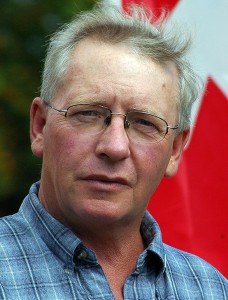Home »

Compost facility going to second public hearing
By Ian Cobb
e-KNOW
Enough of a stink has been raised and concerns over the stink staining fair process prompted Regional District of East Kootenay (RDEK) board members to vote for a deferral of final reading of two bylaws that if approved would open the door for a commercial composting facility in the Mayook area, east of Cranbrook.
Only City of Kimberley Mayor and board director Don McCormick voted against deferral of Bylaws No. 2672 and 2673 (Hwy. 3/93 / EarthRite Industries Ltd.) following intensive discussion and presentations June 8.
Along with voting to defer the final reading, the board voted to rescind the third readings and return the matter to a second public hearing.
If approved together the bylaws “would permit industrial uses including a commercial composting facility, a tire recycling facility, gravel extraction, a farm and garden centre, and collection and processing of wood waste material on the subject property. The bylaws will also correct two areas where residential zone boundaries do not match current and proposed subdivision boundaries. The subject property is located at 7235 Hwy. 3/93, just east of Cranbrook,” the RDEK planning report explained.

Electoral Area A Director Mike Sosnowski urged fellow board members to return the bylaws to a second hearing, citing the volume of lobbying that has been done since the last hearing on May 26.
“We need to get the emotion out of this. With the concerns we’ve heard, the education we have, I think this is the way to go,” Sosnowski suggested.
RDEK Planning & Development Services Manager Andrew McLeod said regional staff would like an impact assessment completed.
McCormick argued postponement would “accomplish anything. At the end of the day it’s about execution; how it’s managed,” he said.
The first public hearing drew 14 people. Of those who spoke, 11 expressed opposition and two were in favour.
Among issues of concern for those opposed were smell, noise, highway safety, impacts to ground water, loss of property values and intrusion of industrial zoning into rural/residential.
A 17-signature petition presented by Frank and Rhonda Elzinga stated “all the neighbouring landowners are against this proposal.”
One of those signatories appeared before the regional board Friday, to press home some of the concerns.
“I have serious concerns,” said Mike Haslam. “Not all matters of this application were made clear to you.”
He told the board the proponent has stated the closest home to the site (Haslam’s) is 685 metres but is only 375 m and his lifestyle would be impacted by odour and noise.
Haslam also pointed out the Electoral Area C Advisory Planning Committee is unanimously opposed to the establishment of such a facility in that location.
“There are way too many negative factors working against this facility,” he said, suggesting the board should only allow such an operation in existing industrial areas or at the Central Subdivision Landfill.
Haslam asked the board members to consider how they would feel if they were faced with such a facility being proposed beside their homes.
Kris Pickering of EarthRite Industries Ltd. and Dr. John Paul of Transform Compost Systems also addressed the board Friday morning.
“A commercial compost facility is needed in our region,” Pickering said, adding he doesn’t see the Mayook area as “residential.”
He told the board he looked into the landfill area for his facility and the purchase of the old Cranbrook dump site and neither were options.
Regional staff told the board that siting such a facility at the landfill would require additional permitting and the need to put it out for bid.
Dr. Paul explained that odor control at the site would be far easier to attain than in damper climates, such as on the coast where he hails fro, noting the more moisture “odor goes up logarithmically.”
Paul told the board EarthRite is well positioned to run an environmentally sensitive facility. “We have a lot of tools in the toolbox,” he said.
Sosnowski’s recommendation for referral reflected the wishes of regional planning staff.
In a report to the board, RDEK planning technician Tracy Van de Wiel outlined: “In June 2016, the RDEK passed Resolutions No. 46327 and 46328, giving third reading to the bylaws to permit industrial uses on the subject site.
“The common law prohibition on receiving new information after the close of a public hearing may extend to the final adoption or defeat of the bylaw. Because of the delay created in the adoption of the bylaw due to the requirement for provincial approval, a window has been created for the opponents of third reading to engage the Board of Directors. This may create issues with respect to the perceived fairness of the bylaw amendment process.
“Therefore, a second public hearing is recommended so that all sides of the issue have the opportunity to be heard, reheard or to present new information on the proposed land use change. Additional research on the legal issue will be undertaken and any recommendations for changes to RDEK process or procedures will be brought forward in due course.”
Cranbrook’s two board members voted for deferral. Mayor Lee Pratt said the landfill option should be explored, while Coun. Tom Shypitka, noting he’d “like to see it work,” said he has concerns about “spikes” in odour.
Electoral Area C Director and board chair Rob Gay, who also voted for deferral, said homes are not visible from the applicant’s property and it gives the impression no one lives nearby but that isn’t the case.
Local environmental watchdog Wildsight Kimberley Cranbrook is in support of the proposal.
“As an environmental non-profit organization with a vested interest in food sustainability and environmentally friendly practices, we feel this operation will help divert unnecessary waste from landfills. It will also create a useful soil by-product that can be used in the region,” stated Wildsight Kimberley Cranbrook branch manager Andrea Chapman in a letter to the RDEK.







